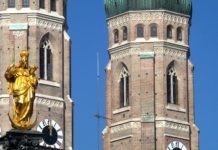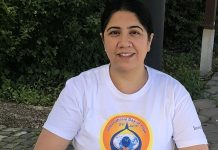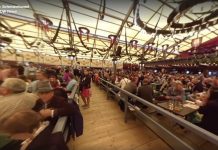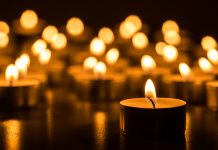Special to MunichNOW — The eyes of the world have been on Paris for the last two weeks as events unfolded in the City of Light that have had global repercussions. In her first “Letter from France”, Kim Terrell gives us an inside look.
. . . endless motorcycles parked on top of one another, a man playing bagpipes, children on the shoulders of their parents and grandparents, dogs with their owners, wheelchairs rolling down bumpy cobblestones, sounds of sirens overtaken by spontaneous, rhythmic clapping from the crowd, multitudes of ethnicities walking side by side . . .
On January 7, 2015, two men walk into the planning meeting at the offices of Charlie Hebdo and kill twelve people. At day’s end, seventeen people are dead. I am sitting at my computer writing when the first news of the events in Paris begins to filter into the breaking-news stream, making its way across my screen. A dear friend of mine is making his way back to Brussels after having spent the holidays in France.
My eyes follow the letters forming words detailing unfolding events, but my mind does not quite understand. Then a series of anguished, angry texts announce themselves on my phone. Devastated, my friend re-routes himself into Paris. We talk and decide to meet in Paris for the march that springs up organically in response to the murders. I begin making phone calls.
Two days later at 5 a.m., I find myself on a rainy road to Paris with two friends who are driving to Amsterdam. On route, we pass numerous police vehicles headed in the same direction. My friends drop me at Porte d’Italie a gateway into Paris a little after 10 a.m., and I descend into the metro and catch a train bound for Les Gobelins. The apartment where we will stay is not yet ready, so I sit in a café at the corner of Les Gobelins and Boulevard Saint-Marcel, drinking coffee and watching people going about their Saturday.
Every time sirens erupt, people on the street stand still for a moment, looking in the direction of the sounds, then move on. After too many cups of coffee, I get a text saying that the apartment is ready, so I walk about 200 meters to a door with a keypad, enter the code, and climb five flights of curving wooden stairs. The apartment is small and amazing, filled with books and rugs hanging on the walls. It is also beautifully quiet, sheltered from the street noise. I feel immediately at home. I look through the bookshelves, marveling at the eclectic collection of subject matter. Benoît arrives around 2 p.m., and we walk around the city well into the evening then come back, talk, and watch some news. Benoît grew up with Charlie Hebdo and was influenced by the cartoons of Cabu and the other murdered cartoonists.
He talks about the influence that Cabu and the others had on him. Below are his words as he spoke and texted them. “They were all pacifists, against the use of weapons; the two elders were against the war led by France in Algeria in the 60s and took part in the events in 1968. Since then, they have been on TV and written for several newspapers. I grew up with them, and they contributed to building my sight and awareness as well as that of many of the people around me: how many times did they prove that a good drawing is so much better than a thousand words?
The I Love You Wall, with “I Love You” written in hundreds of languages, brainchild of Frederic Baron, in Paris — MunichFOTO[/caption] They showed me . . . us . . . how a sense of humor can be strong, smart, and most of the time, elegant, in the face of stupidity, awkwardness, totalitarianism, and absurdity. They liked life and its pleasures and made no secret about it. They hated pricks in their huge diversity. They were already warned in 2008, when they decided to publish caricatures of Mohammed from a Danish newspaper.
Back then they were put on trial, but they won. They had such a sane, sharp eye on the bullshit of our times. Who will continue the job? What talent. What loss. What a sadness! Why this invitation to go back to the middle ages? What shape is this world taking? I am shocked. I am hurt. I am pissed off.” Some who grew up with freedom take it for granted. But the people of France, and Europeans in general, know all too well the dangers of taking anything as fragile as freedom for granted. On Sunday morning, we ease into the day. Mid-afternoon, we pass through the open gates of the metro and ride for free as far as we can, then we join the mass of humanity moving through the streets of Paris.
Benoît is intrepid and determined, and through a series of switchbacks, alleyways, and what seem like endless forays against the current of people who have been turned back, we arrive in the midst of one of the main arteries of the march, snaking towards Place de la nation and Place de la république. This maneuvering has taken us hours, and we are content to stand on the center island in the middle of this huge thoroughfare for a moment and simply watch and feel the human energy gliding by us. We move on.
My mind is busy recording images, and I am vaguely aware of police presence moving with the crowd and standing in doorways and on street corners, machine guns pointed towards the ground. But I am more aware of the energy and spirit of this mass of humanity united in purpose . . . endless motorcycles parked on top of one another, a man playing bagpipes, children on the shoulders of their parents and grandparents, dogs with their owners, wheelchairs rolling down bumpy cobblestones, sounds of sirens overtaken by spontaneous, rhythmic clapping from the crowd, multitudes of ethnicities walking side by side, signs declaring “Imagine No Religion,” “Not in My Name,” “Nous sommes, Charlie,” “Nous sommes humains,” “Liberté pour tous,”. . . and on and on it went.
My eyes snap photo after photo after photo and imprint them on my heart, then we are at the center of everything at the base of the statue at the epicenter of the unity march. Saturday it had rained, and the slope surrounding the statue is muddy and slippery. People grab hold of one another, helping each other up the slippery slope and picking one another up when someone falls—which I almost did and would have, if I had not had firm support during my descent.
Chants of Liberté pour tous!, freedom for everyone, Vive France!, Vive le monde!, long live the world, fill the air. The energy is electric. The crowd energized and united. Chants of Liberté pour tous!, freedom for everyone,Vive France!, Vive lemonde!, long live the world, fill the air . . .
We stand for a long, long time in the midst of this united energy field, and as day turns to night, people begin to light candles, and new waves of people stream in as others leave. Eventually we thread our way out of the center and meet some other people for a meal. We eat, drink, and talk with one another and those around us. Since the murders, much has been written. Opinions abound. Agendas are detailed, questioned, and challenged. Insults flung. Blame placed and replaced.
I have no interest in writing about any of that, for others have and will do so ad nauseum. I found the march amazing. It flowed. It was a river of people, and I was swept into the arms of humanity at our best. It was an amazing day which felt timeless . . . a day whose intention I wish we could embrace more readily and more often. And though much needs doing and atrocities abound, it felt good to take a moment and celebrate what unites us. I think that I will spend the rest of my days celebrating and writing about what unites us—without ignoring what separates us—but simply shift my emphasis in the days ahead.
A final image for me, from the streets of Paris on this weekend, is buying fruit from an Arab street vendor. We buy oranges and some lychee fruit. He hands us our brown bags, then gives us two oranges as a gift. I think to myself, go in peace . . . may all of us go in peace. As we walk away, I know that hidden among the worst tragedies of our time are gifts we can give to one another, and if our leaders encourage us to hate and to fear, perhaps the greatest gift for us to give one another is to turn away from those leaders and join one another in the street of life, rather than listen to those who have no concept of what it means to be living “on the ground.”
+++++++++
About Kim Terrell
I have always been a writer. Through all my other endeavors, that fact has remained constant. I began my career working in the theater as an actress, then left acting to attend university. After graduating from Northeastern University in Boston, I moved to Colorado Springs and went to work in the Aerospace Industry as a system engineer. Over the next twenty years, I worked on a myriad of space-related projects in a number of different capacities, from system engineer to Project Manager.
These projects took me and my daughter from Boston to Colorado Springs; Colorado Springs to Omaha; Omaha to St Louis; St Louis to Albuquerque; Albuquerque to Los Angeles. I worked with talented teams of people on space-related projects defining evolving system requirements, then moved to design strategies and eventually implementations.
My years in aerospace taught me a great deal—mostly with respect to self-discipline, focus, and follow-through. However, something was missing. It was time to return to my first two loves… writing and theater.
In 2001, while still working as a system engineer in Huntington Beach, CA, I founded a non-profit theater company, the Virtual Theatre Project (VTP), whose mission was to “identify and produce work written specifically for the stage.” In service of that mission, VTP ran an annual, then a semi-annual international playwriting competition, “The Pen is a Mighty Sword.” This competition asked for “bold, passionate, provocative plays” written specifically for the stage and offered $2,000 plus full production to the winning play. I read in excess of 5,000 plays over a ten-year period. During this time, I also wrote plays and produced plays, while having the privilege of working with a company of wonderful actors and directors.
I had the great good fortune to meet some talented playwrights; at that time, some were up and coming like Lauren Gunderson, Caridad Svich, and Vincent Delaney, and some were well established, like William Missouri Downs. All of them have unique voices. Then came 2008. I was in Australia, having just left Japan, when I read about what was happening with the banking system worldwide.
Let it suffice to say that funding for our project vanished, as did the prospects and the website for the Virtual Theatre Project. Currently I am a “pen for hire”—living in France, ghosting for others, and researching and writing my own projects. Join Kim on LinkenIn Follow Kim’s blog





























